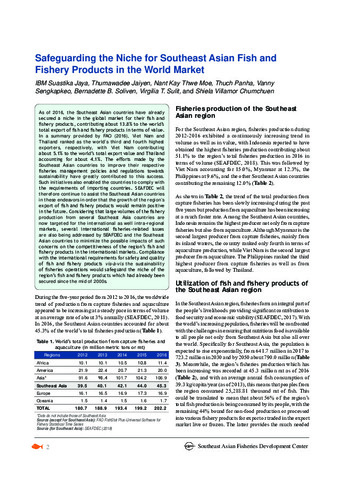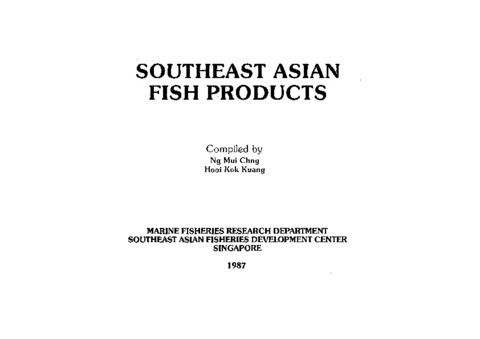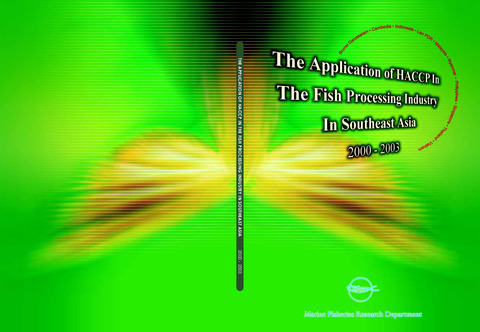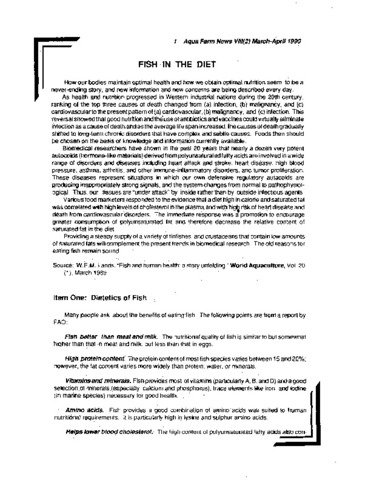Safeguarding the niche for Southeast Asian fish and fishery products in the world market
Share
| dc.contributor.author | Jaya, IBM Suastika | |
| dc.contributor.author | Jaiyen, Thumawadee | |
| dc.contributor.author | Moe, Nant Kay Thwe | |
| dc.contributor.author | Panha, Thuch | |
| dc.contributor.author | Sengkapkeo, Vanny | |
| dc.contributor.author | Soliven, Bernadette B. | |
| dc.contributor.author | Sulit, Virgilia T. | |
| dc.contributor.author | Chumchuen, Shiela Villamor | |
| dc.date.accessioned | 2019-05-21T03:51:11Z | |
| dc.date.available | 2019-05-21T03:51:11Z | |
| dc.date.issued | 2019 | |
| dc.identifier.uri | http://hdl.handle.net/20.500.12066/4809 | |
| dc.description.abstract | As of 2016, the Southeast Asian countries have already secured a niche in the global market for their fish and fishery products, contributing about 13.8% to the world’s total export of fish and fishery products in terms of value. In a summary provided by FAO (2016), Viet Nam and Thailand ranked as the world’s third and fourth highest exporters, respectively, with Viet Nam contributing about 5.1% to the world’s total export value and Thailand accounting for about 4.1%. The efforts made by the Southeast Asian countries to improve their respective fisheries management policies and regulations towards sustainability have greatly contributed to this success. Such initiatives also enabled the countries to comply with the requirements of importing countries. SEAFDEC will therefore continue to assist the Southeast Asian countries in these endeavors in order that the growth of the region’s export of fish and fishery products would remain positive in the future. Considering that large volumes of the fishery production from several Southeast Asia countries are now targeted for the international as well intra-regional markets, several international fisheries-related issues are also being addressed by SEAFDEC and the Southeast Asian countries to minimize the possible impacts of such concerns on the competitiveness of the region’s fish and fishery products in the international markets. Compliance with the international requirements for safety and quality of fish and fishery products vis-à-vis the sustainability of fisheries operations would safeguard the niche of the region’s fish and fishery products which had already been secured since the mid of 2000s. | en |
| dc.language.iso | en | en |
| dc.publisher | Secretariat, Southeast Asian Fisheries Development Center | en |
| dc.subject | South East Asia | en |
| dc.title | Safeguarding the niche for Southeast Asian fish and fishery products in the world market | en |
| dc.type | magazineArticle | en |
| dc.citation.volume | 17 | |
| dc.citation.issue | 1 | |
| dc.citation.spage | 2 | |
| dc.citation.epage | 11 | |
| dc.citation.journalTitle | Fish for the People | en |
| dc.subject.asfa | fisheries | en |
| dc.subject.asfa | fishery economics | en |
| dc.subject.asfa | trade | en |
| dc.subject.asfa | marketing | en |
| dc.subject.asfa | fishery products | en |
| dc.subject.asfa | processing fishery products | en |
| dc.subject.asfa | fish utilization | en |
| dc.subject.asfa | Fishery industry | en |
| dc.subject.asfa | fishery management | en |
| dc.subject.asfa | resource management | en |
| dc.subject.asfa | Fishery policy | en |
| dc.subject.asfa | product development | en |
| dc.subject.asfa | sustainability | en |




